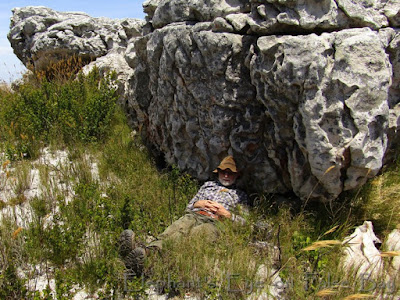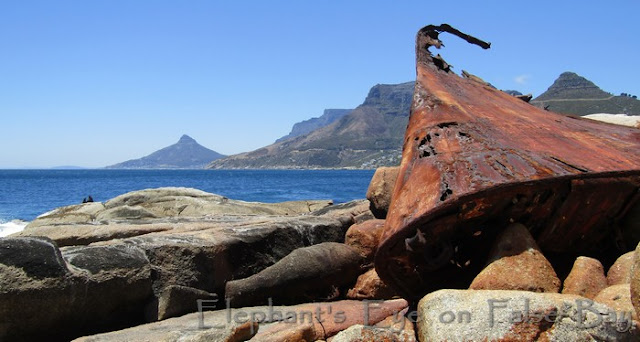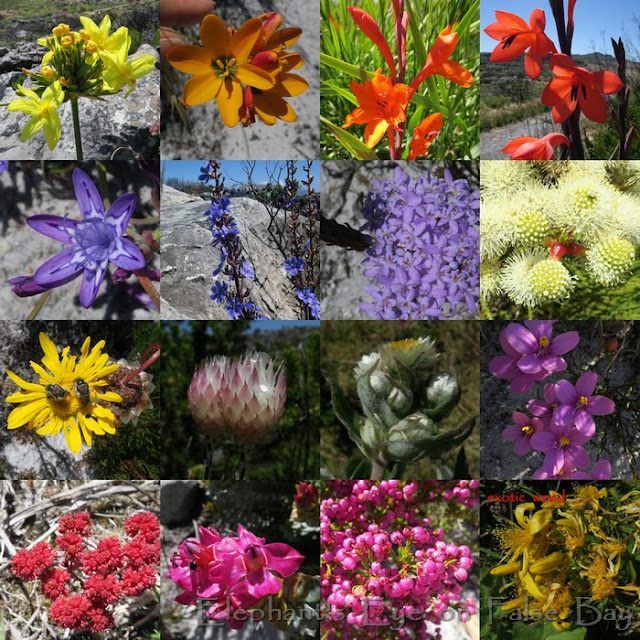Kanonkop shipwrecks and summer flowers
by Diana
Studer
- gardening for biodiversity
in Cape Town, South Africa
Hiking among wildflowers
in the mountains
around Cape Town
An old signal cannon aims at Cape Point. Kanonkop is in Cape
Point Nature Reserve.
Suikerbossie in Hout Bay holds childhood
memories of Sunday tea. Scones and cream. My U3A Fynbos Ramblers took me above that
restaurant. A little pocket of the mountain that has missed the many wildfires,
where I saw my tallest and oldest yellow pincushion Leucospermum conocarpodendron. Companion in blue for scale. We
crossed a remnant of Thomas
Bain's road lined with Eucalyptus.
Victoria Road along the coast between Camps Bay and Hout Bay was built in 1887.
Another place and time, and the flowers were also in a parallel universe that
day.
December flowers above Suikerbossie. Micranthus alopecuroides comb flower in vibrant lavender. Cyanella hyacinthoides Lady's Hand
(resembles hyacinth?) Watsonia borbonica I
remember an after fire year in Camps Bay when the whole slope of Lion's Head
was this colour! Arctotis aspera with
monkey beetle. Lampranthus emarginatus shimmering
pools of mauve. Corymbium africanum
with iris leaves is, an endemic daisy! Lichtensteinia
lacera will be a pale yellow umbel (Beware of the related blister bush
which looks like celery!) Relieved to see invasive alien pines that come up
after fire were ring barked. Berkheya
armata with sharp teeth. Hibiscus
aethiopicus trails along low to the ground. Crassula flava not orange or red, but lemon yellow - this one I
noticed. Commelina africana while the
commonorgarden Tradescantia is blue. Otholobium fruticosans in purple and
white. Indigofera psoraloides not
indigo but terracotta. Aspalathus
cephalothes var violacea not the
expected yellow. Rafnia angulata yet another yellow pea to learn (Rafn was a
Danish botanist)!
Cape of Storms with a trail of shipwrecks. His hike started near the same Hout Bay Neck but headed towards Sandy
Bay. Cape Town's nudist beach if you want an all over tan.
 |
| Sandy Bay and Little Lion's Head to Lion's Head (between the Lions is Judas the last of the Twelve Apostles) |
To Oude
Schip Island and the wreck of fishing vessel Harvest Capella 1986 they
crossed an isthmus. Walking on water. IN water as it was deceptively clear but
at low tide you can cross.
He had a chance to see the BOS
400 crane 1994.
At the end of November we were at Redhill. On the slope
above the road was a horde of Agapanthus
africanus. A few early flowers with many more promised for Christmas.
Ruined
farmhouses at Redhill. Maylands and Kleinplaas survive only as names on a
hiking trail. New houses are being built at Dido
Valley for land claimants.
November flowers at Redhill. Bobartia indica a 'bunch of reeds'
before its true flowers, named for German botanist Bobart. Ixia dubia yellow deepened by red buds and dark centres. Watsonia zeyheri blazing orange. Watsonia tabularis in salmon. Delicate
blue and white stripes on Lapeirousia
corymbosa. Aristea tall and blue. Macrostylis
villosa mauve with two red stripes. Berzelia
abrotaniodes showing its red legs. Ursinia
paleacea feathery seeds and two happy monkey beetles. Edmondia sesamoides pink and white buds opening to yellow centres. Helichrysum foetidum (leaves can be used
to dress wounds). Chironia linoides glowing
in pink (gentian family). Crassula
glomerata a trail of drops of blood. Fierce pink Saltera sarcocolla is endemic to fynbos Penaeaceae. Erica
multumbellifera flowers like tiny cherries. Swathes of bright yellow along
seeps are an exotic
weed Hypericum.
In November he hiked above Misty Cliffs over Redhill and down
to Scarborough via Baskloof Fynbos Private
Nature Reserve.
 |
| CMCA (Cape Mountains for the Curious and Adventurous) U3A hiker resting in comfort above Scarborough |
Resting above Scarborough with U3A hikers.
Pictures by Diana and Jürg Studer
I invite you to join us at Elephant's Eye on False Bay.
Please subscribe as you prefer
via Feedly,
or Bloglovin,
or Facebook
Teal blue text is my links.
To read comments if you are in email or a Reader,
first click
thru to the blog)
Thanks for comments that add value. Maybe start a new thread
of discussion? BTW your comment won't appear until I've read it. No Google
account? Just use Anonymous, but do leave a link to your own blog. I would
return the visit, if I could...
I welcome comments on posts from the last 2 months.









It must wonderful discovering so many beautiful flowers and having such spectacular scenery on your walks. I wonder whether my Great Grandfather ever went along any of the Thomas Bain roads! It is amazing how long it has taken to allow the families back to where they originally left. Sarah x
ReplyDelete.
It makes my heart ache each time I walk past 'just a name' on a sign. But I have seen the roads laid out for the new houses.
DeleteMost of our mountain passes are a legacy from Thomas Bain - so I am sure he did!
I'd never have imagined that Leucospermum could grow so large! I need to find a spot to grow Watsonias. They did unbelievably well in my former garden squeezed into a relatively small space between the neighbor's fence and our driveway so there has to be room for them here somewhere.
ReplyDeleteI brought watsonias from Porterville. There, they bloomed - here they haven't :~(
DeleteScones and cream--yum! Your December flowers are as pretty as your November flowers, which are as pretty as the flowers of every other month in your stunning part of the world!
ReplyDeleteIt sounds such a little thing, but we were not an eating out sort of family - and that was real treat!
DeleteI love the summer flowers, especially the blazing orange and salmon ones, but who could choose between all those beauties. Thank you for the link to Thomas Bain... in 2012 Paul and I did a day drive around Paarl, and then went through the Little Karoo, (breathtaking landscape...) and we were very impressed with the passes, tunnels and (bridges?) that he had was responsible for, what an legacy he has left to the country. Good to read a bit more about him and his work.
ReplyDeleteI have often stopped to admire the drystone walls along his roads. Finely crafted work which still stands strong.
DeleteHappy New Year Diana! That's a lot of beautiful wildflowers. How i wish i can reach your part of the world. If you garden for biodiversity, i garden for butterflies, hehehe.
ReplyDeleteWhen we came home today, a citrus swallowtail was resting with spread wings ... photo coming in my January garden post.
DeleteI am happy with where I live and there are U3As offering good things, but when I read this post I dream of moving to Capetown and joining the local U3A to go on those walks and see the countryside and the flowers. Except the old cannon. That jarred - a memory of war and conflict in such a lovely place. Maybe I should put CT on the top of my bucket list.
ReplyDeleteBe at peace. This is a signal cannon. Cape Town was founded to supply fruit and veg for passing ships. This would tell farmers - there's a ship in the harbour - bring food. There would be passengers and post to collect.
DeleteI like the photo of the canon on the hill, very dramatic, it could belong in an old war movie.
ReplyDeleteAmalia
xo
This cannon is peaceful - fired to tell farmers there is a ship in the harbour waiting for supplies.
DeleteStaggering cliffs.
ReplyDeleteSome of his pictures make me grateful they are 'only pictures'
DeleteMy mother grew Agapanthus in England. I wish I could grow it in my Pennsylvania garden.
ReplyDeleteThey are not so happy in our gardens - there are caterpillars, but I share and enjoy the few flowers.
DeleteAs always, I am impressed with the beauty and diversity of plant life you find on your hikes. I am glad you included the photo for scale of the pincushion. That is huge! And not only lovely plants, but a shipwreck!
ReplyDeleteI am used to large bushes - being a third of that height!
DeleteSad stories between beautiful blooms ...
ReplyDelete